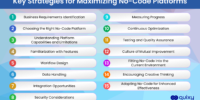Application Programming Interfaces (APIs) serve as the backbone of modern software development, facilitating seamless communication between different software systems. Crafting a user-friendly API is essential for ensuring smooth integration and fostering positive developer experiences. In this article, we’ll delve into some quick tips to help you design APIs that dazzle both developers and end-users.
1. Prioritize Intuitive Endpoints
When designing APIs, prioritize intuitive endpoint naming conventions. Clear and concise endpoints enhance the overall usability of the API, making it easier for developers to understand and interact with your service. Avoid overly complex or ambiguous names, opting for simplicity and clarity.
2. Provide Comprehensive Documentation
Thorough documentation is the key to a successful API. Clearly outline the purpose of each endpoint, include sample requests and responses, and provide relevant code snippets. Comprehensive documentation empowers developers to integrate your API efficiently and reduces the learning curve.
3. Embrace Consistency in Data Formats
Consistency in data formats promotes predictability and simplifies the integration process. Choose widely accepted formats such as JSON or XML and stick to them across all endpoints. This consistency streamlines development and ensures a smoother experience for developers working with your API.
4. Implement Versioning for Future Compatibility
APIs evolve over time, and versioning is crucial for maintaining backward compatibility. Implement versioning from the beginning to avoid breaking existing integrations when making updates. This practice ensures that developers can confidently adopt newer versions without fear of disrupting their applications.
5. Prioritize Security Best Practices
Security is paramount in API design. Implement authentication mechanisms such as API keys, OAuth, or JWT to control access to your API. Encrypt sensitive data during transmission using HTTPS, and regularly update security protocols to address emerging threats. Prioritizing security builds trust and credibility among developers.
6. Optimize Response Payloads
Efficient API responses contribute to a positive user experience. Optimize response payloads by including only essential information, avoiding unnecessary data. Implement pagination for large datasets and provide options for developers to customize the response based on their specific needs.
7. Foster Developer Engagement
Create a supportive developer community around your API. Establish forums, provide a feedback mechanism, and actively engage with developers. A vibrant community not only enhances the visibility of your API but also fosters a collaborative environment for sharing insights and best practices.
Conclusion
Designing a user-friendly API requires a thoughtful approach that considers the needs of both developers and end-users. By prioritizing clarity, documentation, consistency, security, efficiency, and community engagement, you can create an API that dazzles and stands out in the competitive landscape.








